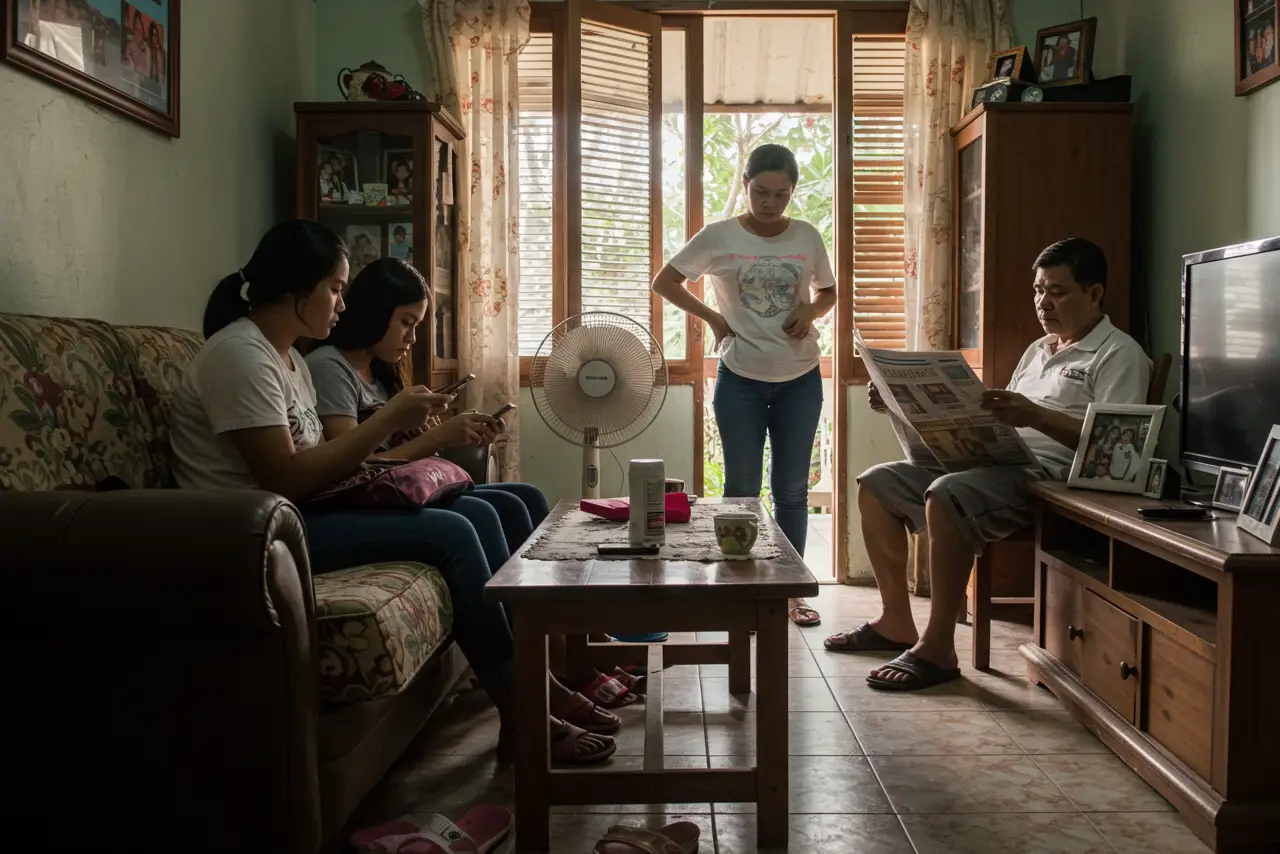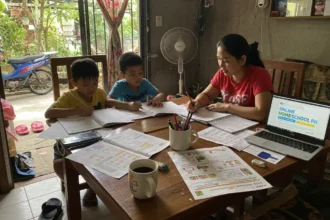Parenting teenagers in the Philippines can feel like riding a rollercoaster-may halong excitement, fear, joy, and frustration all in one. One moment your teen is sweet and affectionate, the next they’re slamming their bedroom door because “you don’t understand.” Sound familiar? You’re not alone.
- 🧠 Understand the Adolescent Mind
- 🗣️ Communication is Key
- 🛑 Setting Boundaries and Rules (and Allowing Freedoms)
- 🔥 Dealing with Common Issues
- 📱 Technology and Social Media: Finding the Balance
- 🤝 Maintaining a Strong Bond
- 🚨 When to Seek Help
- ❓ FAQs on Parenting Teenagers in the Philippines
- 🌿 Parent Self-Care: Caring for Yourself While Caring for Your Teen
- 🌱 Thriving Together Through the Teenage Years
- 📚 References
Filipino teens today face a unique mix of challenges: balancing family expectations with their growing independence, dealing with social media pressures, keeping up with heavy school loads, and sometimes even helping support the household. As parents, it’s easy to feel overwhelmed. But here’s the good news-raising teens Pinoy-style doesn’t have to mean endless conflict. With patience, open communication, and a deeper understanding of what they’re going through, you can survive-and even thrive-during these teenage years.
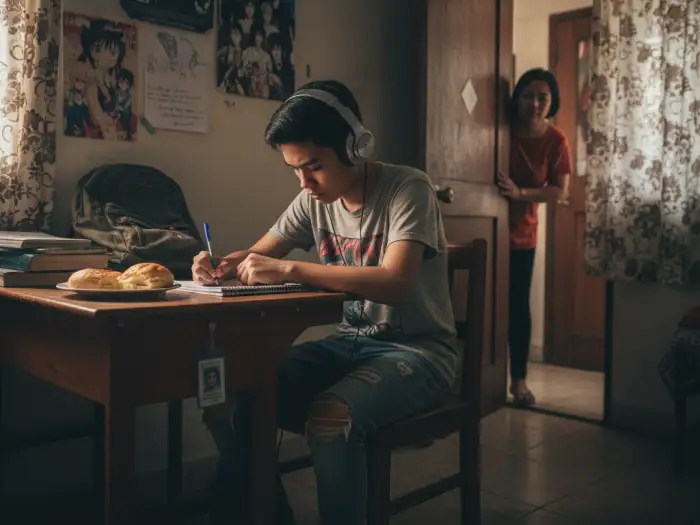
🧠 Understand the Adolescent Mind
To survive the teenage years, it helps to know what’s really going on inside your child. Adolescence isn’t just about pimples, growth spurts, and deeper voices-it’s also a time of massive brain and emotional changes. Science shows that the prefrontal cortex, the part of the brain responsible for judgment and decision-making, is still developing until the mid-20s. That’s why teens can sometimes act impulsive, overly dramatic, or “parang walang isip” (as parents say).
Why Your Teen Acts the Way They Do
-
Mood swings – Hormones fluctuate rapidly during puberty, making emotions unpredictable. A happy teen at breakfast can be sulking by lunch.
-
Risk-taking – Teens are wired to seek excitement and peer approval. That explains why some experiment with fashion, slang, or even risky behavior.
-
Identity search – Adolescents are figuring out who they are. This may come across as rebellion, but often it’s just exploration.
-
Stronger peer influence – Barkada approval can sometimes outweigh parent approval. This is natural, though it can be frustrating for families.
Why Parents Shouldn’t Take It Personally
When your teen snaps, rolls their eyes, or retreats to their room, it doesn’t always mean they’ve stopped loving or respecting you. More often, it’s their developing brain struggling with new emotions, independence, and identity. Understanding this helps parents respond with patience instead of anger.
Raising teenagers in the Philippines means navigating both science and culture: while teens crave freedom, they’re still deeply tied to Filipino family values. Knowing this balance helps parents guide them with firmness and empathy.
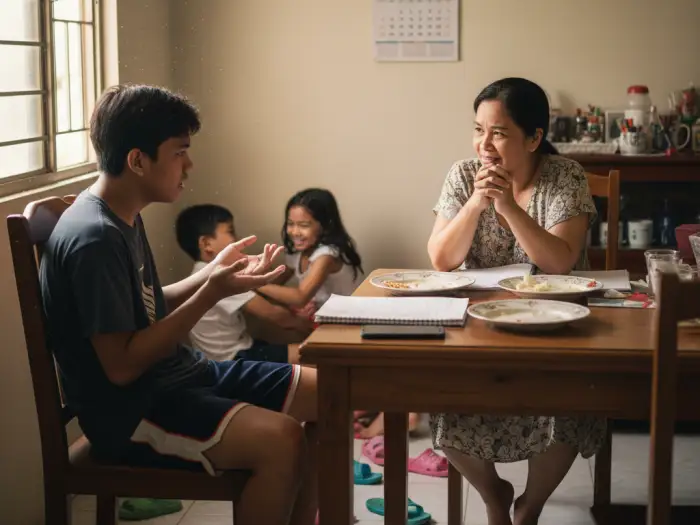
🗣️ Communication is Key
If there’s one superpower that makes parenting teenagers in the Philippines easier, it’s communication. Teens may not always say it, but they want to be heard and understood. The problem? Many Filipino parents slip into lecturing mode too quickly-“Noong panahon namin…”-which often shuts teens down. Building open, respectful conversations is the foundation of a strong parent-teen bond.
Listen More, Lecture Less
When your teen shares something, fight the urge to immediately correct, scold, or compare them to others (“Bakit si anak ni Kumare honor student, tapos ikaw…”). Instead, practice active listening:
-
Nod, maintain eye contact, and say things like: “I hear you. That sounds tough.”
-
Allow them to finish their story before giving advice.
-
Repeat back what they said to show you understood (“So you felt embarrassed when…”).
-
Avoid multitasking-put your phone down so they see you’re really paying attention.
-
Resist the urge to connect every story to your own past right away. Sometimes they just want to vent.
Ask Open-Ended Questions
Instead of grilling them with yes/no questions:
-
❌ “Nag-aral ka ba?” → ✅ “Anong pinaka-natunan mo today?”
-
❌ “Kumain ka na?” → ✅ “Anong kinainan niyo sa canteen? Masarap ba?”
-
❌ “Sino kasama mo?” → ✅ “Sino mga bago mong friends? Kamusta sila?”
-
❌ “Okay ka lang?” → ✅ “What was the best and hardest part of your day?”
-
✅ “If you could change one rule in school, what would it be and why?”
These encourage longer, more thoughtful answers and show genuine curiosity about their world.
Create Casual Chat Moments
Big talks don’t always happen face-to-face at the dining table. Sometimes the best conversations happen during:
-
Car rides to school or after pickup
-
Grocery runs (“Anong gusto mong dagdag sa grocery list?”)
-
Helping with chores (sabay hugas ng pinggan o sampay ng labada)
-
Eating street food together (fishball, kwek-kwek, isaw) after errands
-
Watching basketball or TV shows together (“Team ka ba kay Gilas or NBA?”)
-
Family walks, jogging, or while gardening outside
These low-pressure moments make it easier for teens to open up.
Keep Your Tone Calm but Firm
Filipino families are passionate, and voices can rise quickly. But when discussions turn into shouting (sigawan), teens often shut down or push back harder. Use a calm but firm tone when setting boundaries-it communicates respect while still asserting authority.
Sample Approach for Difficult Talks
Instead of: “Ano ba yan! Kabataan ngayon wala ng respeto!”
Try:
-
“I know you feel strongly about this. Tell me more so I can understand your side.”
-
“Let’s talk about this calmly. I want to hear your point first.”
-
“Pwede bang usap tayo mamaya pag pareho tayong kalmado?”
-
“I understand bakit gusto mo yun, pero kailangan din nating isipin ang consequences.”
This doesn’t mean you’ll always agree-but it shows your teen you’re willing to listen, making them more likely to listen in return.
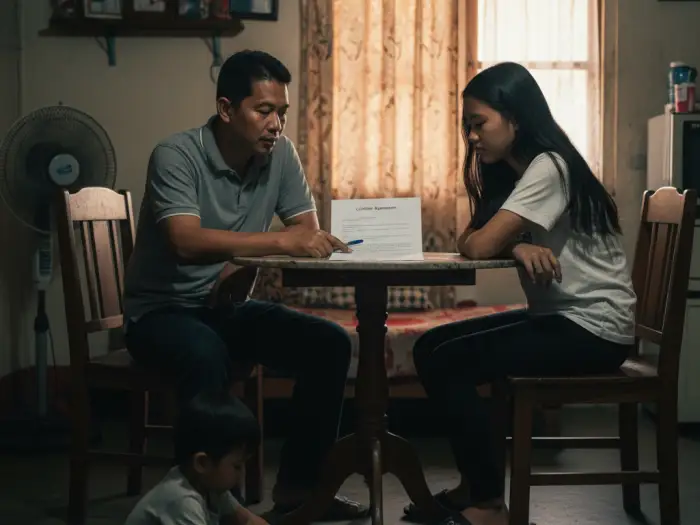
🛑 Setting Boundaries and Rules (and Allowing Freedoms)
Filipino parents are known for being protective-sometimes to the point of being called “mahigpit.” And while structure is important, teenagers also need space to make choices and build trust. The key is balance: clear, consistent rules paired with earned freedoms.
Why Boundaries Matter
Boundaries give teens security. Knowing what’s allowed and what isn’t sets clear expectations. Without rules, they may test limits endlessly; with overly strict rules, they may rebel harder.
Examples of Reasonable Boundaries
-
Curfews – School nights: 9 PM. Weekends: 10 or 11 PM.
-
Study time – At least 1–2 hours of uninterrupted study before gadgets.
-
House chores – Washing dishes, sweeping, helping younger siblings with homework.
-
Gadget use – No phones during family meals, limited gaming hours on weekdays.
-
Respect – No shouting at parents, using proper greetings (“mano po,” “good evening po”).
-
Safety – Always inform parents where they are, who they’re with, and how they’ll get home.
Allowing Freedoms to Build Trust
When teens follow rules responsibly, reward them with more freedom. For example:
-
If your teen consistently follows a 9 PM curfew, consider extending it to 10 PM on special occasions (like a friend’s birthday).
-
If they manage their schoolwork well, allow extra gaming hours on weekends.
-
If they show responsibility with money, let them handle a small weekly allowance for budgeting.
-
Trust them with short solo trips (to the mall, to buy something at the grocery) once they’ve proven reliability.
-
Give them privacy in their room-as long as they maintain respect and boundaries.
Explain the “Why” Behind Rules
Teens are more likely to follow rules if they understand the reason:
-
Instead of: “Bawal ka lumabas after 9 PM kasi sabi ko!”
-
Try: “We set your curfew at 9 PM so you get enough rest for school. Health mo ang concern namin, hindi para pigilan ka makipagkaibigan.”
Consistency is Crucial
-
Both parents (and even lolo/lola if they live in the house) should enforce the same rules to avoid confusion.
-
Don’t change punishments mid-way or let one parent always play “good cop.” Mixed signals erode respect for rules.
Adjust Rules As They Grow
Boundaries should evolve with age. A 13-year-old may have stricter limits than a 17-year-old who’s preparing for college. As teens prove themselves, gradually loosen restrictions to show that trust is earned, not demanded.

🔥 Dealing with Common Issues
Every parent of teenagers in the Philippines will eventually face tough moments-rebellion, mood swings, peer pressure, academic stress, and fights over gadgets. The key isn’t to avoid these issues (they’re part of growing up) but to handle them with patience, perspective, and consistency.
Rebellion and Disobedience
It’s normal for teens to push boundaries. What matters is how parents respond.
-
Choose your battles – Decide what’s non-negotiable (safety, respect, core values) vs. what’s negotiable (haircuts, music taste, fashion choices). A dyed hairstyle isn’t as critical as cutting class or lying.
-
Appropriate consequences – If they break a major rule, consequences should fit the action: grounding from a weekend outing, reducing gadget time, or extra chores.
-
Avoid public shaming – Don’t rant on Facebook or compare them to other teens; this damages trust and self-esteem.
-
Example: If your son sneaks home late, calmly explain the danger (e.g., safety on the streets) and shorten curfew temporarily. Once he rebuilds trust, restore privileges.
Mood Swings and Emotional Distance
Hormones + stress = unpredictable moods.
-
Don’t take it personally – Teens may withdraw, stay in their room, or get easily irritated. This doesn’t mean they’ve stopped caring about you.
-
Offer gentle presence – Knock and ask, “Gusto mo ng merienda?” or sit with them quietly while they watch TV. Sometimes just being there is enough.
-
Look for deeper causes – Persistent sadness, anger, or distance may signal bullying, heartbreak, or academic struggles.
-
Example: If your daughter suddenly becomes quiet and loses interest in hobbies, consider a one-on-one date-like a coffee shop chat or a walk-to gently ask what’s going on.
Peer Pressure and Barkada Influence
In Filipino culture, barkada is powerful-sometimes more influential than family.
-
Get to know their friends – Invite them over for lunch, movies, or group study. Hospitality lets you observe dynamics without being intrusive.
-
Teach refusal skills – Role-play how to say “no” without losing face: “Di pwede, my mom will literally pick me up if I don’t come home.”
-
Encourage positive groups – Suggest joining sports teams, school clubs, or church youth groups where peers share good values.
-
Example: If your teen asks permission for an overnight barkada trip, discuss safety plans and set conditions (e.g., “Call us every night at 9 PM”). Show flexibility if they’ve earned trust.
Academic Pressure and Future Worries
Filipino teens often juggle school stress, college entrance worries, and family expectations.
-
Support, don’t micromanage – Help with time management, but avoid hovering over every homework page.
-
Avoid comparisons – Instead of “Bakit si anak ni Kumare honor student?” say, “Nakikita ko effort mo, and I’m proud of you.”
-
Guide, don’t dictate – When choosing college courses or SHS strands, listen to their passions while offering practical advice.
-
Example: If your son struggles with math but shines in art, support art workshops while still encouraging discipline in academics.

📱 Technology and Social Media: Finding the Balance
For Filipino teens, gadgets and social media aren’t just entertainment-they’re their social lifeline. TikTok dances, late-night MLBB (Mobile Legends: Bang Bang) matches, group chats, and Instagram posts are how they connect with friends. But left unmanaged, screen time can cause family conflicts, poor sleep, and even exposure to online dangers.
Why Teens Are Glued to Their Screens
-
Social connection – Barkada chats and memes make them feel included.
-
Validation – Likes, shares, and comments give instant gratification.
-
Escapism – Stress from school or family pushes them toward games or binge-watching.
-
Curiosity – Teens naturally explore trends, influencers, and even risky online challenges.
Healthy Rules for Screen Time
-
No phones during meals – Protect family time.
-
Tech curfew – Example: no devices after 10 PM on school nights.
-
Balance study vs. play – Finish homework first, then earn gadget time.
-
Screen-free zones – Bedrooms at night or study tables during class hours.
Engaging, Not Just Policing
Instead of outright bans (which teens often resist), try involvement:
-
Ask about their favorite game or TikTok creator.
-
Let them teach you a trend (“O, anak, turuan mo si mama ng trending dance na yan”).
-
Watch or play together occasionally to understand their online world.
Online Safety Musts
-
Privacy settings – Teach them to lock accounts to friends only.
-
Avoid oversharing – No posting of full addresses, school IDs, or schedules.
-
Cyberbullying awareness – If they get harassed online, encourage screenshots, blocking, and reporting.
-
Digital footprint – Remind them: what they post online can affect future opportunities.
Turning Tech Into a Positive Tool
-
Encourage use of learning apps (Duolingo, Khan Academy).
-
Explore creative platforms (Canva, digital art apps).
-
Suggest volunteering online (tutoring, advocacy groups).
-
Create family projects (like a TikTok cooking series or vlog).
👉 Bottom line: Technology isn’t the enemy-it’s how we guide its use. With balance, gadgets can be bridges, not barriers, in your parent-teen relationship.

🤝 Maintaining a Strong Bond
Even as teenagers pull away to assert independence, deep down they still crave connection with their parents. The challenge is to keep the relationship warm and supportive-without being overbearing. A strong bond becomes their anchor through the ups and downs of adolescence.
Bond Through Shared Activities
-
Weekly routines – A jog with dad on Sundays, cooking a favorite dish together, or a Netflix night every Friday.
-
Errands as bonding time – Turn grocery runs, palengke shopping, or even driving to school into casual chat opportunities.
-
Hobbies – Join them in their interests: watch a K-drama together, play basketball, or even let them teach you Mobile Legends.
-
Food as a bridge – Merienda time (fishball, lugaw, turon) is a great moment to connect casually.
Respect Their Privacy
-
Knock before entering their room-small gestures show you treat them as young adults.
-
Avoid reading diaries or snooping through phones unless there’s a serious safety concern.
-
Trust builds when teens feel respected. The more you respect their space, the more likely they’ll let you in voluntarily.
Keep Family Traditions Alive
-
Sunday lunches – Whether at lola’s house or a local carinderia, weekly meals keep family ties strong.
-
Religious or cultural traditions – Simbang Gabi, fiesta participation, or barangay events are moments that root teens in Filipino values.
-
Celebrations – Don’t skip birthdays, graduation milestones, or small victories (like finishing exams). Recognition strengthens family bonds.
Small Gestures Go a Long Way
-
Send them a funny meme on Messenger or TikTok.
-
Slip a short encouraging note in their bag before exams (“Good luck anak, proud kami sayo.”).
-
Surprise them with their favorite snack after a long school day.
These gestures remind your teen that even as they grow more independent, they remain deeply loved.
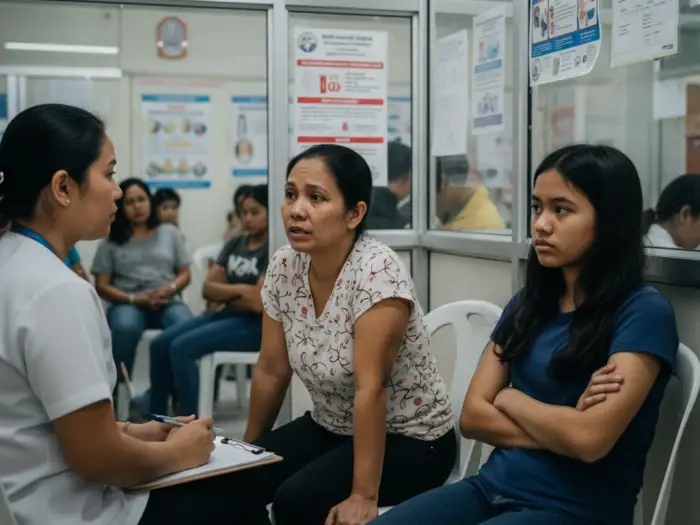
🚨 When to Seek Help
Parenting teenagers in the Philippines comes with its share of ups and downs, but sometimes the issues go beyond “normal” teenage drama. How do you know if it’s just mood swings-or if it’s time to bring in outside support? Recognizing red flags early can make a huge difference in your teen’s well-being.
Red Flags That Need Attention
-
Persistent sadness or hopelessness – If your teen seems down most days for weeks, not just after a breakup or exam.
-
Loss of interest – Suddenly dropping hobbies, friends, or even appetite for their favorite food like adobo or Jollibee.
-
Extreme mood swings – Going from irritable to withdrawn to unusually energetic in unpredictable ways.
-
Talk of worthlessness or self-harm – Statements like “Wala naman akong silbi” or hints about hurting themselves.
-
Risky behavior – Experimenting with alcohol, drugs, or dangerous activities more than once, not just curiosity.
-
Declining school performance – Sharp, sustained drop in grades or frequent absences.
-
Social withdrawal – Avoiding barkada, family gatherings, or even staying in their room all day.
Where Parents Can Turn for Support
-
Guidance Counselors – Most schools in the Philippines have trained counselors who can help with academic stress, bullying, or emotional struggles.
-
Psychologists or Psychiatrists – Mental health professionals can provide therapy, coping strategies, or medication if needed.
-
Support Hotlines – The National Center for Mental Health has a 24/7 crisis hotline: 1553 (landline) or 0966-351-4518 (Globe) / 0917-899-8727 (Globe).
-
Church or Community Leaders – Some families find comfort and mentorship through priests, pastors, or trusted youth leaders.
How to Approach Your Teen About Getting Help
-
Be gentle, not accusatory – Instead of “Anong problema mo ba?” try “Napapansin ko na lagi kang malungkot. Gusto mo bang may makausap na makakatulong?”
-
Normalize mental health care – Compare it to physical health: “Kung sumakit ang ulo mo, pupunta tayo sa doctor. Kung mabigat ang pakiramdam mo, may doctors din para dun.”
-
Offer to go with them – Reassure them they won’t go through it alone: “Sasamahan kita kung gusto mo.”
Breaking the Stigma
Older generations in the Philippines sometimes dismiss therapy as “arte lang” or unnecessary. As modern parents, we must break that stigma. Mental health is health. Seeking professional help doesn’t mean you’ve failed as a parent-it means you’re doing what’s best for your child.
❓ FAQs on Parenting Teenagers in the Philippines
1. My teen keeps comparing our rules to their friends’ rules. What do I say?
Acknowledge their feelings but stand firm: “Every family has different rules. Ours are set to keep you safe and healthy.” Offer flexibility if they consistently prove responsibility.
2. My teenager barely talks to me. How do I get them to open up?
Don’t force heavy talks. Use casual moments-like car rides, chores, or sharing merienda-to ask light questions. Sending funny memes or TikToks can also break the ice.
3. How do I guide my teen morally without sounding preachy?
Lead by example. Share real stories of honesty or responsibility from your own life instead of long lectures. Teens notice actions more than words.
4. Is rebellion normal during the teenage years?
Yes, testing limits is part of adolescence. Focus on setting clear boundaries for safety and respect, while allowing freedom in less critical areas like fashion or hobbies.
5. How do I handle mood swings without losing patience?
Remember mood swings are partly hormonal. Don’t take it personally-offer food, space, or a listening ear instead of reacting with anger.
6. What should I do if I don’t like my teen’s barkada?
Get to know their friends first-invite them over for lunch or movie night. If you see negative influence, calmly explain your concerns and encourage healthier groups without outright bans.
7. How much gadget time is healthy for teens?
Balance is key. Set rules like no phones during meals and no late-night use, but also respect that online life is part of their social world.
8. How can I support my teen’s academic struggles?
Avoid constant comparisons. Help them manage time, consider tutoring if needed, and celebrate small wins. Guide them toward their strengths instead of only pressuring for honors.
9. When should I consider professional help for my teen?
If you notice persistent sadness, risky behavior, or talk of worthlessness, it’s time to seek guidance. Start with the school counselor or a mental health professional.
10. How do I keep my bond strong even if they pull away?
Respect their privacy but stay present. Knock before entering their room, keep family traditions alive, and plan bonding activities-even if they pretend to resist, most teens secretly appreciate it.

🌿 Parent Self-Care: Caring for Yourself While Caring for Your Teen
Parenting teenagers can be exhausting-parang rollercoaster na walang tigil. Between school stress, mood swings, and constant negotiations about rules or gadgets, it’s easy for parents to feel burned out. But remember: you can’t pour from an empty cup. Caring for yourself is just as important as caring for your teen.
Why Self-Care Matters
-
A calmer parent = a calmer household.
-
Teens mirror how we handle stress; showing healthy coping teaches them resilience.
-
Rested parents are more patient, better listeners, and more consistent in discipline.
Practical Self-Care Tips for Filipino Parents
-
Find parent allies – Join support groups online like Homeschoolers of the Philippines or local parent communities where you can swap stories and advice.
-
Take short breaks – A 15-minute walk, a quick coffee with a friend, or journaling after work helps clear your head.
-
Strengthen your marriage/partnership – Align rules with your spouse/partner to avoid mixed signals, and also enjoy couple time apart from parenting duties.
-
Set realistic expectations – No parent is perfect. Remind yourself that mistakes (yours or your teen’s) are part of the journey.
-
Spiritual or mindfulness practices – For some, prayer, meditation, or even simbang gabi can be grounding and restorative.
The Power of “Me Time”
It’s not selfish to enjoy your hobbies-whether gardening, biking, or watching your favorite teleserye. A happier parent creates a healthier environment for teens to grow.
🌱 Thriving Together Through the Teenage Years
Raising teenagers in the Philippines may feel overwhelming at times-parang rollercoaster with twists and turns you didn’t see coming. But these years are also a golden chance to deepen your relationship with your child as they grow into young adults. With patience, empathy, and open communication, the challenges of mood swings, rebellion, and peer pressure become opportunities to guide them toward resilience and responsibility.
Remember: your teen may roll their eyes, shut their door, or insist they don’t need you-but deep down, they still crave your love and guidance. By balancing firm boundaries with trust, respecting their individuality, and celebrating small wins, Filipino parents can raise confident, compassionate, and capable young people.
In the end, parenting teens isn’t just about surviving-it’s about thriving together as a family. 💖
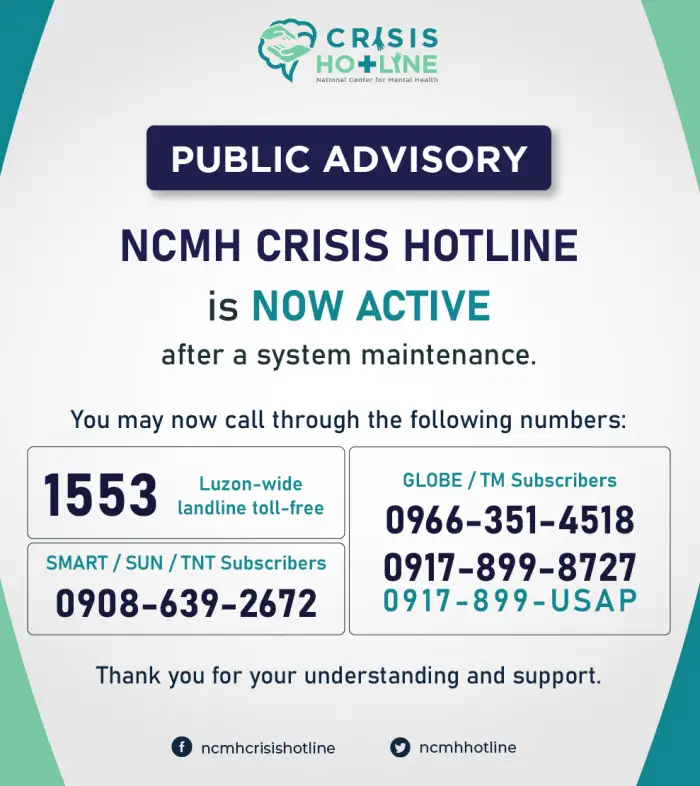
📚 References
-
National Center for Mental Health (NCMH) Crisis Hotline –
-
24/7 support for teens and families facing mental health concerns
-
1553 landline
-
0966-351-4518 Globe
-
0917-899-8727 Globe
-
0908-639-2672 Smart
-
-
World Health Organization – Adolescent Health
-
National Youth Commission (NYC) – Programs for Filipino Youth



